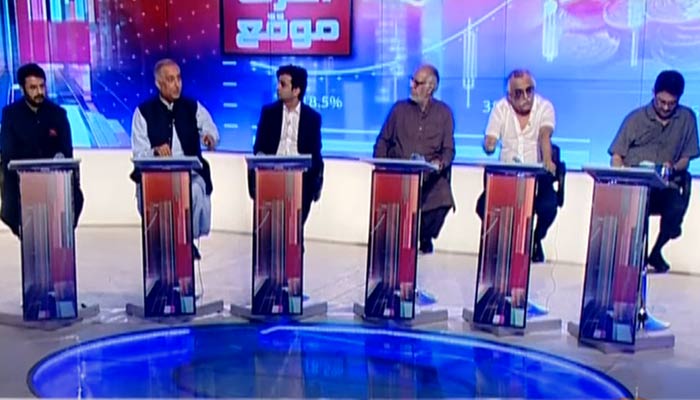Experts advocate for taxing all sectors to broaden tax base
Geo News holds Great Debate to bring out best proposals for country's economic stability and tax system
The financial experts and representatives of major trade associations have stressed on inclusion of all the sectors into tax net in a bid to achieve a broader tax base as Geo News organised the Great Debate programme to bring out the best proposals regarding economic stability amid crucial challenges.
Experts say that the masses cannot be "served for free" as the country faces a difficult economic situation.
Former finance minister Miftah Ismail, former FBR chairman Shabbar Zaidi, economist Ammar Habib, President of Kisan Etihad Council Khalid Khokhar, President of All Karachi Traders Etihad Atiq Mir and Chairman of Abad Asif Sumsum expressed their views in the programme hosted by senior journalist Shahzeb Khanzada.
Miftah, who is a former Pakistan Muslim League-Nawaz (PML-N) leader, said that the entire world has expanded the tax net and Pakistan can also do that. He said that the outgoing fiscal year was also “wasted” by not expanding the tax net, while mentioning that the tax to GDP ratio will reach 10% this year but that would still be insufficient.
“The situation here in the country is that no tax is collected from the gold sector,” Ismail added.
He suggested that different tax rates on properties in the real estate sector should be abolished and sales tax should be imposed on the industrial level instead of collecting taxes from the retailers.
He also called for taking all stakeholders related to tax collection matters onboard and introducing a fixed tax system.
Meanwhile, former Zaidi said that electricity consumers should be brought into the tax net while acquiring the power connection, which he said is not a practice in Pakistan.
He said that there were 3 million industrial consumers and only 100,000 of them file the tax returns.
“Our economy is not working. The entire nation would have to work together for the tax collection system,” the economist stated.
Zaidi noted that the amount of property tax collected from Mumbai alone was greater than the property tax collected from entire Pakistan.
He suggested that property surveys should be conducted, while lamenting that the political system of the country doesn’t want any big change.
Meanwhile, Atiq Mir urged the traders to become filers as it would benefit them.
“Policies made behind the closed doors don’t work,” he said, adding that the policies made on the governmental level were not implemented.
He said that small traders should be approached and issues of tax payers should be resolved. The tax net couldn’t be expanded by force, he added.
Mir said that electricity bills were a major burden on the consumers and running businesses had become difficult in the current economic situation.
Economic expert Ammar Habib suggested abolition of cash economy and shifting focus on the digital payments.
“Cash transactions of more than Rs5,000 should be banned,” he said.
Though he noted that the gold traders would never accept digital payments but the issues can be resolved by setting up a system.
Khokhar lamented that “agriculture and farmers have never been the country’s priorities”.
He said that the Pakistani farmers didn’t get as much profit compared to the farmers elsewhere in the region.
“Our production cost is way too high. The agriculture sector is no longer profitable in my view as the farmers suffer losses on each crop,” Khokhar said.
He suggested that the production cost for the farmers should be slashed.
Khokhar said that the agriculture sector needs at least 7% growth, adding that the sector would be abolished if the sales tax imposed on agriculture input.
-
$44 billion Bitcoin blunder: Bithumb exchange apologizes for accidental payout
-
Global memory chip crunch puts spotlight on Apple; Will iPhone become more pricey?
-
Bitcoin plummets toward $60,000 as investors dump risky bets
-
Bitcoin crashes below $63K as regulatory pressure and market fears grow
-
Bitwise Crypto Industry innovators ETF: What investors should do in 2026?
-
Nintendo shares slide again as momentum fears grow
-
Gold, silver prices fallen sharply; What’s driving the drop?
-
Gold’s record climb: Experts question if its safety is ‘overstated’












